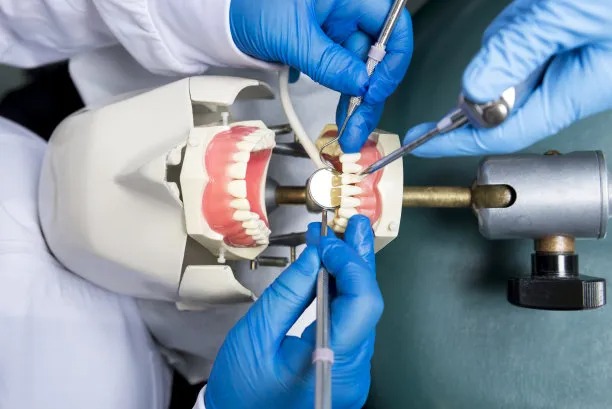Summary: Dental implants have become a popular solution for tooth replacement, offering functionality and aesthetic appeal. To ensure successful outcomes, several essential guidelines and precautions must be adhered to throughout the process. This article outlines four key aspects to consider: the importance of pre-operative assessments, meticulous surgical techniques, post-operative care necessities, and the role of patient compliance in the healing process. Each section not only highlights the individual components vital for the success of dental implantation but also emphasizes the broader picture of maintaining overall oral health. By understanding and implementing these guidelines, both clinicians and patients can contribute to achieving the best possible results.
1. Importance of Pre-Operative Assessments

A thorough pre-operative assessment is essential for the success of dental implant surgery. Patients must undergo a comprehensive examination, including medical history evaluations and imaging studies, to identify any potential complications. High-quality radiographs such as panoramic X-rays or CT scans can help in assessing bone density and the anatomical layout of the jaw, ensuring appropriate implant placement.
Additionally, understanding the patient’s medical history is crucial. Factors such as diabetes, smoking, and other systemic conditions can significantly influence healing times and success rates. Therefore, consultations with the patient regarding these aspects can pave the way for a tailored surgical approach.
Moreover, discussing treatment expectations and setting realistic goals with the patients fosters a positive environment. By providing clarity on the procedures and outcomes, patients can better prepare psychologically for the surgery, which contributes to its overall success.
2. Meticulous Surgical Techniques
Once pre-operative assessments are completed, the surgical procedure itself must be executed with precision. The implementation of aseptic techniques during surgery is non-negotiable, as it minimizes the risk of infections that could jeopardize the implant’s success. Surgeons should follow strict protocols to ensure a sterile environment.
The next crucial step involves the accurate placement of the implant within the jawbone. Correct angulation, depth, and positioning play vital roles in the immediate stability of the implant. Advanced surgical techniques such as guided implant surgery can significantly enhance the accuracy of placement, leading to improved outcomes.
Finally, employing the use of high-quality materials for implants ensures their longevity and success. Utilizing implants that are biocompatible with the human body will support the integration of the implant into the bone, promoting a stable foundation for restoration. Proper selection of surgical techniques and materials can make a marked difference in the success of the dental implantation process.
3. Post-Operative Care Necessities
Post-operative care is paramount for fostering healing following dental implant surgery. A well-defined care plan should be provided to the patient, encompassing dietary restrictions and medication guidelines. Soft foods are usually recommended to minimize stress on the surgical site, and patients should be encouraged to stay hydrated.
Furthermore, proper oral hygiene practices must be emphasized. Patients need to be instructed on gentle cleaning around the implant site to prevent infection while also avoiding any aggressive brushing that could disturb the healing tissue.
Additionally, regular follow-ups with the dental care provider are critical during the healing period. These visits allow for monitoring of the implant site for signs of complications like infections or improper healing. By maintaining communication with the dental team, any emerging issues can be promptly addressed, further supporting the success of the implant.
4. The Role of Patient Compliance in Healing
Patient compliance plays an indispensable role in the success of dental implants. Adhering to prescribed medications and following post-operative guidelines can greatly influence outcomes. Patients who strictly follow their dentists instructions are generally more likely to experience smoother healing processes.
Education regarding lifestyle choices is vital as well. Patients should be informed about the detrimental effects of smoking and excessive alcohol consumption, which can hinder healing and undermine the implants success. Encouraging healthy habits can lead to improved overall outcomes.
Lastly, fostering a supportive network around the patient can promote better compliance. Family and friends can offer encouragement and assist in maintaining the necessary lifestyle adjustments post-surgery. An environment that supports healing contributes significantly to the longevity of the dental implant.
Summary:
The discussion surrounding the successful implantation of dental solutions highlights several vital aspects. From pre-operative assessments to patient compliance, each factor is interconnected and essential for achieving optimal outcomes. Focusing on these guidelines enables both practitioners and patients to work collaboratively towards shared dental health goals.
This article is compiled by Vickong Dental and the content is for reference only.
Vickong Dental
Vickong Dental is a large medical group established in Hong Kong in 2008 by professors from well-known medical universities in Guangdong and Hong Kong, as well as medical doctors from key national '985' universities (including Master's supervisors and senior professors). The chain of branches brings together expert dentists with PhDs and Master's degrees from Hong Kong and Mainland China, committed to providing high-quality dental treatment.
"Vickong Dental Practices the University Motto of 'Healing and Serving Society,' with a Stable Operation for Sixteen Years. It Has Been honored with Hong Kong Enterprise Leaders's Choice,' and is a Global Trusted Implant Center for the Nobel Implant System. Recommended by Hong Kong Metro Broadcast and Guangdong Television, it Serves Customers from Over Thirty Countries and Regions, Gaining the Trust and Favor of Citizens from the Guangdong-Hong Kong-Macau Greater Bay Area and Surrounding Cities.

Thousands of customers' unanimous praise
The most recognized and highly recommended dental service by customers in the Guangdong-Hong Kong-Macau Greater Bay Area
We Ensure You Receive Detailed Care and Attention Here
Hong Kong standards, Shenzhen prices, Your Trusted English-speaking dentists

Vickong Dental Medical-Grade Instrument Disinfection Process
Vickong Dental Medical-Grade Instrument Disinfection Process

Vickong Dental Chain: A Warm and Comfortable Environment for Treatment






Appointment Hours

Q&A
Why choose Vickong Dental?
Vickong Dental practices the university motto 「Medicine to Benefit Society」, with each branch bringing together highly qualified dentists with doctoral and master’s degrees from Hong Kong and the Mainland, and has maintained seventeen years of steady operation。Recipient of 「2024 Hong Kong Enterprise Leaders Brand」, 「2025 Hong Kong Enterprise Leaders Brand」, a Nobel Biocare Global Trusted Implant Center, and a brand recommended by Metro Radio Hong Kong and Guangdong TV。
To date, we have served customers from more than thirty countries and regions,earning exceptionally high word-of-mouth recognition and trusted recommendations from residents across the Guangdong-Hong Kong-Macao Greater Bay Area and surrounding cities
We have eight major branches in Zhuhai、Shenzhen,and a consultation and service assurance center in Hong Kong,so you can book a free consultation at any time for any questions,which is very reassuring.
If I do not accept the quotation after the CT scan, will I be charged??
No! As long as the actual treatment has not started, you will not be charged any fees.
Will there be any additional charges during the treatment process?
No, there won’t be any additional charges. Before treatment begins, we will clearly explain the treatment plan and its corresponding fees. Only after the patient agrees and signs the consent form will we proceed with the dental service.
Can I pay in Hong Kong dollars?
Yes. Vickong Dental accepts payment in Hong Kong dollars. The amount will be converted based on the exchange rate of the day, and the applicable rate will be clearly communicated to you in advance.
Can I reschedule my appointment at any time?
Yes. Please contact us via **WeChat** or **WhatsApp** as early as possible, providing your original appointment time and details, along with your preferred new date and time slot for rescheduling.













